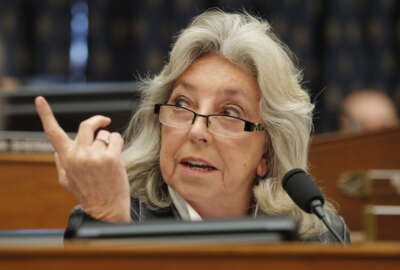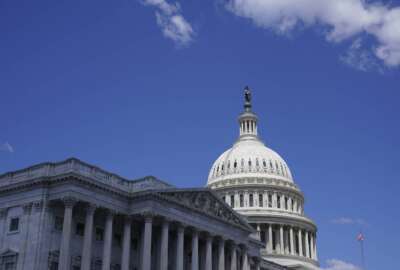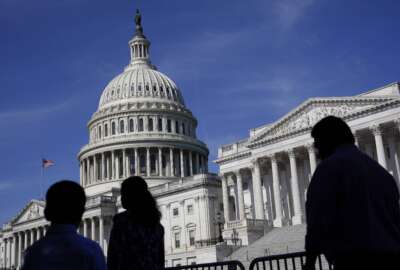
Deadline approaches to pass bill affecting employment for 3,500 FDA workers
Thousands of employees at the Food and Drug Administration would face potential furlough if user fee program legislation isn’t passed by Sept. 30.
Although the House passed legislation to reauthorize user fee programs for the Food and Drug Administration, the companion bill has yet to move through the Senate, with the potential to impact employment for many FDA workers.
The Food and Drug Amendments of 2022 bill cleared the House in a largely bipartisan vote of 392-28 in June, but thousands of FDA employees whose jobs are funded through the legislation could be affected if the Senate doesn’t meet the Sept. 30 fiscal year deadline.
An FDA spokesperson told Federal News Network that more than 3,500 employees would be impacted, leaving fewer than 1,500 full-time employees at the Center for Drug Evaluation and Research (CDER), and half that many at the Center for Biologics Evaluation and Research (CBER).
“To ensure that we don’t have a budget shortfall, without assurance that we can collect fees beyond September, we would have to begin notifying PDUFA-funded staff of impending employment actions in September,” the spokesperson said.
Some members of Congress additionally voiced concerns about the thousands of FDA employees who could face potential furlough notifications.
“Unless the Senate acts urgently to meet its deadline, FDA will be forced to issue reduction-in-force notices and furlough thousands of workers who ensure the safety and efficacy of medical products,” House Energy and Commerce Committee Chairman Frank Pallone, Jr. (D-N.J.) and Ranking Member Cathy McMorris Rodgers (R-Wash.) wrote in a July press release.
The Prescription Drug User Fee Act (PDUFA), which Congress originally passed in 1992, must be reauthorized every five years. FDA typically collects user fees from companies that produce “certain human drug and biological products,” to help expedite the drug approval process, FDA wrote on its website. The current authorization for FDA user fee programs will expire on Oct. 1.
Notably, the resources provided in the user fee agreement “include direct funding for many staff positions across the agency,” FDA Commissioner Robert Califf wrote in a memo to FDA employees on July 29.
Califf said in July that he met with congressional staff to emphasize the importance of the reauthorization, and was “confident that Congress will act quickly and responsibly.”
If the law is not reauthorized in a timely manner, funding from the current user fee program would last about five weeks into the next fiscal year, he added.
“If we have reasonable assurance from Congress that they will act in time to allow us to continue collecting fees after September 30, then we will not need to begin the notification process for PDUFA-funded staff,” Califf wrote.
The FDA spokesperson added that the agency’s obligations to communicate with staff about employment actions depend on the expiration of funding for positions financed through user fees.
“At this time we have a reasonable expectation that the positions supported by user fees will be funded. We will continue to evaluate the situation,” the spokesperson said.
The National Treasury Employees Union, which represents FDA employees, also emphasized the fact that the potential furloughs wouldn’t happen until after Sept. 30, and even if Congress misses the deadline, carryover funds can be used to delay any potential furlough.
“This is not the first time Congress has come close to the user fee deadline but we have yet to see any actual furloughs due to a lack of reauthorization. While it is unfortunate that the agency may be forced to give employees the required notice of a possible furlough, NTEU is doing everything possible to get the reauthorization passed before the fiscal year ends and keep employees informed every step of the way,” NTEU National President Tony Reardon wrote in an email to Federal News Network.
After the House Energy and Commerce Committee initially advanced the reauthorization bill to the full House floor, committee leaders continued to urge the Senate to pass the companion bill.
“There is no reason for the Senate to reject the strongest and best path forward to ensure this reaches the president’s desk,” Pallone and Rodgers wrote in a July press release.
The most recent iteration of the legislation, introduced in the House by Rep. Anna Eshoo (D-Calif.), “reauthorizes FDA user fee programs for certain drugs and devices, establishes requirements to increase diversity in clinical trials and modifies requirements relating to the overall supply chain for drugs and devices.”
Although the Senate Health, Education, Labor and Pensions (HELP) committee initially advanced the legislation favorably, negotiations stalled in July after Sen. Richard Burr (R-N.C.), ranking member of the committee, proposed his own version of legislation for FDA’s user fee programs reauthorization, which omitted several provisions of the initial version. In particular, he removed provisions regarding oversight of cosmetics and dietary supplements.
Burr said his version of the bill “preserves the user fee agreements as they’ve already been negotiated — without harmful additions.”
Sen. Patty Murray (D-Wash.), the HELP Committee’s chairwoman, though, supported the provisions and said the oversight was “long overdue.” She urged Burr to continue with the initial bill, in part to support FDA employees.
“Pink slips are unacceptable to me, and they should be unacceptable to all of us,” she wrote in a July 14 press statement. “The fastest way to get this done is to move forward with the comprehensive bipartisan bill we have already advanced out of committee, and which includes so many desperately needed, long overdue and bipartisan policies.”
Amid the ongoing negotiations, Reardon called the situation “unfair” and said NTEU is “concerned” about FDA employees who may have to question their job security.
“Although legislation is moving through Congress to reauthorize the user fees and avoid furloughs, it will be alarming for employees to receive these notices,” Reardon wrote.
Negotiations for a continuing resolution are still ongoing, with this fiscal year coming to a close on Sept. 30.
“The user fee programs remain an essential part of FDA’s mission to protect public health and accelerate innovation,” the FDA spokesperson said. “It is critical that Congress reauthorize the user fee programs this fiscal year.”
Copyright © 2024 Federal News Network. All rights reserved. This website is not intended for users located within the European Economic Area.
Drew Friedman is a workforce, pay and benefits reporter for Federal News Network.
Follow @dfriedmanWFED





